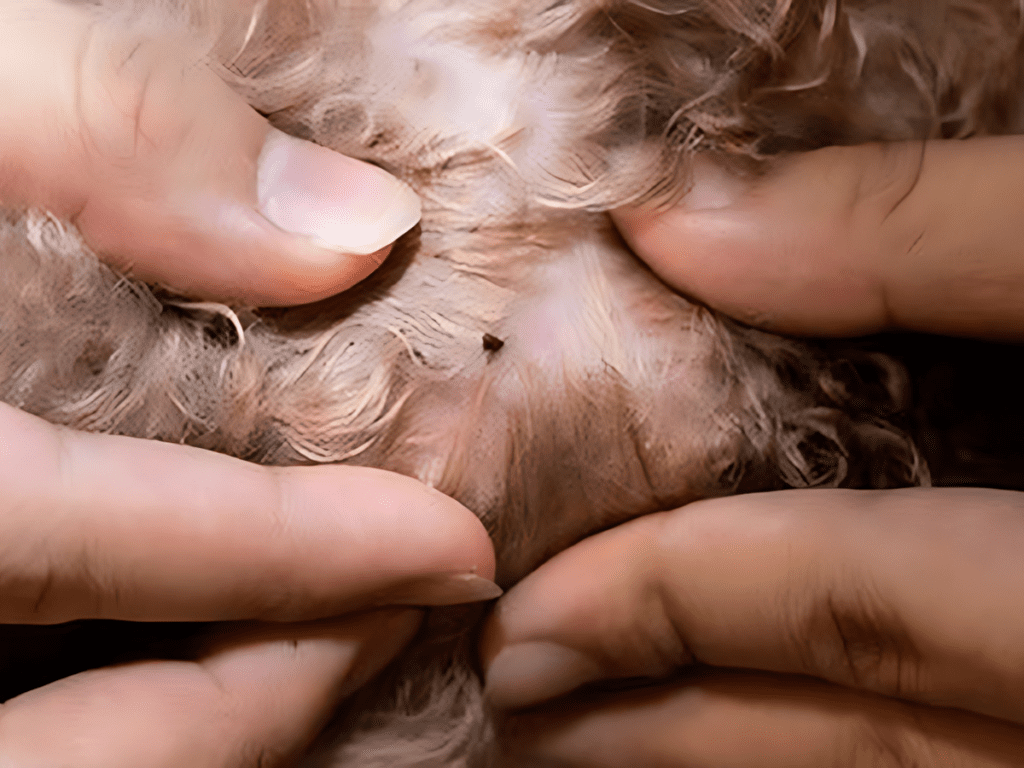As a pet owner, ensuring the health and well-being of our furry companions is a top priority. However, pesky parasites like fleas ticks, and heartworms can pose serious threats to our pets’ health if left untreated. In this comprehensive guide, we’ll delve into effective strategies to protect your pet from these common pests, keeping them happy, healthy, and parasite-free.
Table of Contents
I. Understanding Flea Tick and Heartworms

1. What Are Fleas, Ticks, and Heartworms?
Fleas, ticks, and heartworms are common parasites that can infest our pets and cause a range of health issues. Fleas are tiny, wingless insects that feed on blood, while ticks are arachnids that attach themselves to the skin and feed on blood as well. Heartworms, on the other hand, are a type of parasitic roundworm that infects the heart and lungs of dogs and cats.
2. The Dangers They Pose
These parasites not only cause discomfort to our pets but can also transmit diseases and lead to serious health complications if left untreated. Fleas can cause allergic reactions and transmit tapeworms, ticks can transmit Lyme disease and Rocky Mountain spotted fever, and heartworms can result in severe lung disease and heart failure.
II. Prevention is Key
1. Why Prevention Matters
Prevention is crucial when it comes to protecting our pets from fleas, ticks, and heartworms. By implementing preventive measures, we can avoid infestations and the potential health risks associated with these parasites.
2. Creating a Protective Barrier
Preventative products such as topical treatments, oral medications, and collars can create a protective barrier against fleas, ticks, and heartworms. These products are designed to kill parasites on contact or disrupt their life cycle, effectively preventing infestations.
III. Flea Control Strategies


1. Regular Grooming Practices
Regular grooming sessions can help detect and remove fleas from your pet’s fur before they have a chance to infest your home. Use a flea comb to comb through your pet’s fur, paying close attention to areas like the neck, back, and tail where fleas tend to hide.
2. Environmental Treatments
Treating your pet’s environment is just as important as treating the pet itself. Wash your pet’s bedding regularly, vacuum carpets and upholstery, and use flea control products specifically designed for your home and yard.
IV. Tick Prevention Techniques


1. Avoiding Tick Habitats
Ticks are commonly found in grassy, wooded areas and are most active during the warmer months. Avoid walking your pet in areas where ticks are prevalent, and keep your yard tidy by mowing the lawn and removing leaf litter to reduce tick habitats.
2. Tick Checks
After spending time outdoors, thoroughly check your pet for ticks, paying special attention to areas like the ears, armpits, and between the toes where ticks are likely to attach themselves.
V. Heartworm Prevention Measures


1. Monthly Preventative Medications
Administering monthly heartworm preventative medications is the most effective way to protect your pet from heartworm infection. These medications work by killing heartworm larvae before they mature into adult worms.
2. Annual Heartworm Testing
Regular heartworm testing is essential, even if your pet is on preventative medication. Annual testing ensures early detection of heartworm infection, allowing for prompt treatment before serious complications arise.
VI. Choosing the Right Preventative Products
1. Consult Your Veterinarian
When it comes to selecting the right preventative products for your pet, consult your veterinarian. They can recommend products based on your pet’s individual needs, lifestyle, and risk factors.
2. Consider Combination Products
Some preventative products offer protection against multiple parasites, such as fleas, ticks, and heartworms, in a single application. Consider using these combination products for convenience and comprehensive protection.
VII. Importance of Regular Vet Check-ups
1. Routine Examinations
Regular vet check-ups are essential for maintaining your pet’s overall health and well-being. During these exams, your veterinarian can assess your pet’s parasite status, recommend preventative measures, and address any concerns you may have.
2. Tailored Treatment Plans
Your veterinarian can create a tailored treatment plan based on your pet’s specific needs and health history, ensuring optimal protection against fleas, ticks, and heartworms.
VIII. Signs and Symptoms of Infestation


1. Recognizing the Signs
It’s important to be aware of the signs and symptoms of flea, tick, and heartworm infestations. Common signs include excessive scratching, skin irritation, lethargy, and coughing. If you notice any of these symptoms, consult your veterinarian promptly.
2. Prompt Treatment
Early detection and prompt treatment are key to preventing complications associated with parasite infestations. If you suspect your pet has fleas, ticks, or heartworms, seek veterinary care immediately for proper diagnosis and treatment.
IX. Treatment Options for Infested Pets
1. Veterinary Intervention
If your pet is infested with fleas, ticks, or heartworms, veterinary intervention is necessary. Your veterinarian can prescribe medications to eliminate the parasites and provide supportive care to alleviate any symptoms.
2. Follow-Up Care
After treatment, follow your veterinarian’s recommendations for ongoing parasite prevention and monitoring to prevent re-infestation and ensure your pet’s continued health and well-being.
X. Natural Remedies for Flea and Tick Prevention
1. Herbal Repellents
Some pet owners opt for natural remedies such as herbal repellents to deter fleas and ticks. Ingredients like neem oil, lavender, and citronella can help repel parasites without the use of harsh chemicals.
2. Essential Oils
Certain essential oils, when diluted and applied properly, can also be effective in repelling fleas and ticks. Popular choices include cedarwood, peppermint, and eucalyptus oil. However, it’s important to use caution and consult with a veterinarian before using essential oils on pets.
XI. Heartworm Testing and Treatment
1. Diagnostic Testing
Heartworm testing involves a simple blood test that detects the presence of heartworm antigens in your pet’s bloodstream. This test is typically performed annually to screen for heartworm infection.
2. Treatment Protocol
If your pet tests positive for heartworms, treatment may involve a series of injections to kill adult worms followed by a period of rest and recovery. Treatment can be costly and requires strict adherence to your veterinarian’s recommendations.
XII. Integrating Prevention into Your Routine
1. Consistency is Key
Integrating flea, tick, and heartworm prevention into your pet care routine requires consistency and diligence. Make preventive measures a regular part of your pet’s grooming, healthcare, and outdoor activities to ensure maximum effectiveness.
2. Stay Informed
Stay informed about the latest advancements in parasite prevention and treatment options by consulting with your veterinarian and staying up to date on pet health resources.
Conclusion
Protecting your pet from fleas, ticks, and heartworms is essential for their health and well-being. By implementing preventive measures, staying vigilant for signs of infestation, and seeking prompt veterinary care when needed, you can keep your furry companion safe and parasite-free for years to come.
Frequently Asked Questions (FAQs)
1. How often should I apply flea and tick preventative products?
Apply flea and tick-preventative products according to the manufacturer’s instructions, typically every 30 days during peak parasite season.
2. Can indoor pets get fleas and ticks?
Yes, indoor pets can still get fleas and ticks if they come into contact with infested environments or other pets that are carriers.
3. Is heartworm preventable?
Yes, heartworm is preventable with monthly preventative medications prescribed by your veterinarian.
4. What should I do if my pet has a severe reaction to flea or tick medication?
If your pet experiences a severe reaction to flea or tick medication, seek veterinary care immediately for evaluation and treatment.
5. Are natural remedies as effective as conventional flea and tick preventatives?
Natural remedies can be effective in repelling fleas and ticks for some pets, but their efficacy may vary. Consult with your veterinarian to determine the best course of action for your pet’s specific needs.



